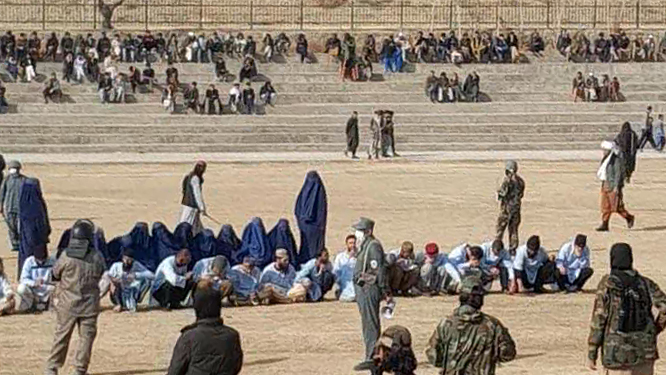The Taliban-run Supreme Court has issued over 176 execution and 37 stoning sentences in the three years since the group took control of Afghanistan. According to statistics from the Taliban’s judicial system, 587 people, including 106 women, have been subjected to corporal punishment in public during this period.
A review of reports from the Taliban’s Supreme Court shows that between March 2022 and March 2023, more than 295 individuals were publicly flogged. In the following year, from March 2023 to March 2024, 44 individuals were publicly flogged. So far in the current year, which began in March 2024, over 240 people have faced the same punishment.
Human rights activists and citizens have condemned the Taliban’s use of corporal punishment, calling it extrajudicial and a violation of human rights. The Taliban resumed public floggings in December 2022.
According to figures published by the Taliban’s Supreme Court, in the year 1401 of the Afghan solar calendar (March 2022 to March 2023), 298 people, including 73 women, were publicly flogged in various provinces, accused of crimes such as moral corruption, running away from home, and theft.
In the following year, 1402 (March 2023 to March 2024), 44 individuals, including 6 women, were publicly flogged on similar charges.
On May 4, 2023, the Taliban’s Supreme Court reported that it had issued 175 execution sentences, 37 stoning sentences, and 4 sentences involving wall collapses on individuals across Afghanistan. However, many citizens believe that the actual number of executions and stonings carried out by the Taliban is higher than what has been publicly disclosed.
Despite widespread international criticism, the Taliban have continued to enforce corporal punishment throughout the current year. As of now, 245 individuals, including 26 women, have been publicly flogged, according to information from the Taliban’s Supreme Court. These individuals were accused of moral corruption, running away from home, and robbery.
Since taking over Afghanistan, the Taliban have publicly executed five people in the provinces of Ghazni, Farah, Laghman, and Sar-e-Pul. Most recently, on August 8, 2024, the Taliban flogged a woman in Kandahar for allegedly running away from home and flogged two other individuals in Maidan Wardak.
Human rights activists and Islamic scholars have criticized the Taliban’s actions, describing them as “cruel and unjust.”
“To reform society, there is a need for structured frameworks and accountable institutions. The current situation in Afghanistan lacks these elements, and the Taliban set the standards for punishment based on their own interpretations,” said Fazl Hadi Wazin, a university professor.
“The Taliban punish people according to their own interpretation of Sharia,” said Maryam Maroof Arvee, a women’s rights activist. “Their interpretation of Sharia is an extremist one.”
Some Kabul residents have also spoken out against the Taliban’s methods, noting that their behavior mirrors that of the Taliban during the 1990s.
“They flog men and women in front of people’s eyes,” one Kabul resident said. “The world must not remain silent in the face of the Taliban’s violence and actions. For three years, the people of Afghanistan have been living in pain and suffering.”
Citizens have repeatedly raised concerns, saying that the Taliban have imposed the “harshest punishments” on the population under the guise of Sharia.
The Taliban’s use of corporal punishment includes executions, amputations, stoning, wall collapses on individuals, and public floggings.





